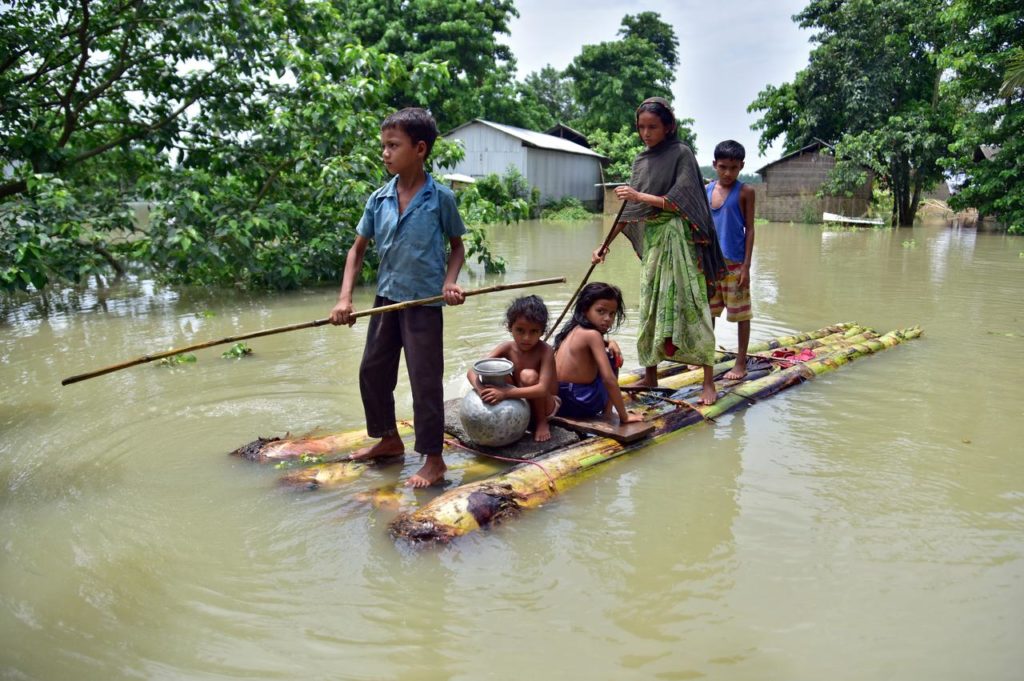Floods Come And Go But Problems Remain For Assam’s Rural Women
Jan 11, 2023 | Pratirodh Bureau
A family rows a makeshift raft through a flooded field to reach a safer place in flood-hit Assam (PTI)
(Source: PTI)
Rebuilding homes, besides helping children and livestock adjust to a new place, as floods turn them into refugees every year is a cross the women in Assam’s Dhemaji district have to bear.
Their menfolk, who are mostly migrant labourers eking out a living in far-off cities or farms, are sometimes blissfully unaware of the floods which have washed away their homes and often family members.
The mighty Brahmaputra and its 26 tributaries inundate vast tracts of land in 1200 odd villages of the district, and they remain under water for a large part of the year – from April to October – as three to four waves of deluge force people to take shelter in safer places, with some of them never coming back.
‘’We have to leave our homes almost every year with our children and livestock during the flood season to safer places. When we return, we have to either repair or rebuild our house … sometimes in a new spot,” Junali Hazong, an Anganwadi worker of Azarbari village, told PTI.
Most of the houses in rural Dhemaji district are built atop bamboo stilts, locally called ‘Chang ghar’. People stay inside the house while livestock is kept below. However, during floods, the animals have to be accommodated inside to protect them from being washed away.
When living at home becomes perilous during floods, they move towards the embankment and return home after the water recedes.
“Some people do not come back and shift to highlands in remote areas in the hope that the impact of flood will be less severe in those areas,” Binita Doley, a homemaker of Medipauma village, said.
Many residents of severely affected villages have moved homes many a time. “Floods are a way of life for us but we face immense difficulties to make both ends meet,” she said.
Women face varied other problems both during flood season and afterwards in the district, where 32 per cent of girls get married before 18 years.
‘‘During floods, we face the problem of hygiene and sanitation, particularly for pregnant and menstruating women, proper nutrition and children’s safety. After the water recedes, fields are not fit for cultivation and we cannot survive on the limited produce, and our men are forced to leave home to earn money,’’ 30-year-old Sumita Pegu said.
“It is not that we want our sons to go outside the village to work but there is no choice. I miss both my sons who are working in Kerala but I don’t want them to return as they cannot get a decent job or earn a livelihood here,’’ said Minu Taye, 54.
Sometimes, women and teenage girls also go out in search of livelihood.
“Migration is a reality but we strive to ensure that it is safe, particularly in the case of women and children, as there exists a high risk of them being trafficked,” said Luit Goswami, Director of Rural Volunteers Centre (RVC), an NGO which works for flood affected people.
However, women of Dhemaji, inhabited mostly by the Mising tribe, besides others such as Hajong and Bodo, are very hard working and contribute a major share to the rural economy, he said.
Rural markets of the region are poorly developed, unregulated and controlled by middlemen and small producers, mostly women, are forced to sell their agricultural produce at non-remunerative prices, Goswami said.
Another problem faced by the villagers is children being taken to neighbouring districts or states to work as domestic help, President of Mukhtiarpur Gram Panchayat Parmananda Pegu said.
“Most parents in the villages want their children to go to schools and there is full attendance at the primary level. But as they reach the middle and high school levels, drop-out rates increase, particularly in case of girls, as they have to travel quite a distance to reach those schools which is difficult during the flood season,” he added.
The RVC provides women with yarn support to weavers, training of weaver groups on improving quality of production, market linkages and livestock and farm-related training, Goswami said.
Mising fabric is much sought after in urban areas of Assam and elsewhere.
The government also has taken several measures to mitigate the problems of flood-hit women of Dhemaji.
“To facilitate income generation, the government helps them form self-help groups, provide them with yarns and improved seeds, and organise livelihood training programmes,” Montesque Doley, an official of Assam State Rural Livelihood Mission, said.
